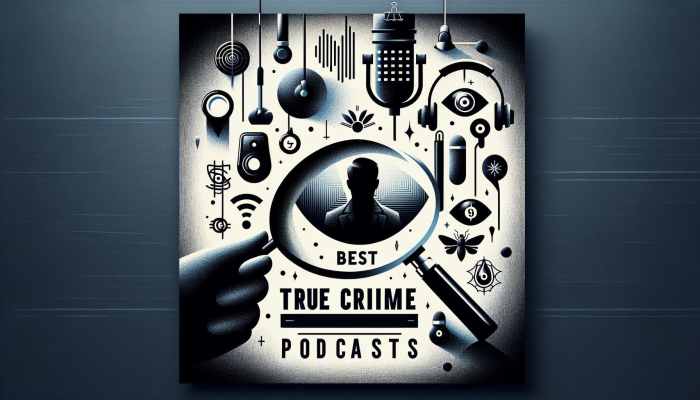
True crime podcasts have surged in popularity, captivating audiences with their immersive storytelling and real-life mysteries. As listeners tune in, they are drawn into a world where crime, justice, and human behavior intertwine, often leading to intense discussions about societal implications. These podcasts employ unique narrative techniques, creating a vivid experience that transforms chilling events into engaging stories.
The allure of true crime podcasts lies not only in their compelling content but also in the innovative ways they present such narratives. With skilled hosts guiding the audience through harrowing tales, enhanced by atmospheric music and sound effects, these productions create an emotional connection, making listeners feel part of the unfolding drama. Each episode is a blend of investigation and storytelling, challenging public perceptions of crime and justice.
Introduction to True Crime Podcasts

True crime podcasts have surged in popularity over the last decade, captivating audiences with their intriguing narratives centered around real-life criminal cases. This genre combines storytelling, investigative journalism, and often a touch of drama, which keeps listeners engaged and eager to learn more about the darker aspects of humanity. The rise of platforms like Spotify and Apple Podcasts has made it easier than ever for creators to share these compelling stories, leading to a diverse array of shows that cater to various interests within the true crime realm.The unique storytelling techniques employed in true crime podcasts play a significant role in their allure.
Producers and hosts often weave together interviews, archival audio, courtroom recordings, and narrative storytelling to create a multi-dimensional experience. This immersive format not only paints a vivid picture of the events but also invites listeners to ponder the moral complexities surrounding each case. By focusing on the human aspects of crime—such as the motivations behind criminal behavior and the impact on victims’ families—these podcasts foster a deeper understanding of the real consequences of criminal acts.
Impact on Public Perception of Crime and Justice
True crime podcasts have significantly influenced public perception of crime and justice, often shaping listeners’ views on legal systems and societal issues. The detailed examination of real cases allows audiences to see the intricacies of the justice system, including its flaws and successes. This exposure can lead to heightened awareness of wrongful convictions, systemic bias, and the emotional toll on victims and their families.The storytelling often emphasizes the human side of crime, which can challenge preconceived notions about criminals and victims.
By showcasing the complexity of individual cases, listeners may develop a more nuanced understanding of the factors that contribute to criminal behavior, such as socioeconomic conditions, mental health issues, and systemic injustices.
“True crime podcasts not only entertain but also educate the public on the realities of crime and the justice system.”
Key takeaways regarding the impact of true crime podcasts include the following points:
- The exploration of wrongful convictions has led to increased public support for criminal justice reform initiatives.
- Listeners often express empathy towards victims and their families, fostering a community of advocacy and awareness.
- True crime podcasts have prompted discussions about the portrayal of crime in media, sparking debates on ethical storytelling.
- These podcasts encourage a critical view of the legal system, prompting listeners to question its effectiveness and fairness.
Key Elements of Engaging True Crime Podcasts

Engaging true crime podcasts captivate listeners through a unique combination of storytelling techniques, soundscapes, and host charisma. These elements work together to create an immersive experience that keeps audiences coming back for more. Understanding what makes these podcasts compelling can help aspiring podcasters craft their own engrossing narratives.One of the most critical aspects of a captivating true crime podcast is the narrative style and pacing.
A well-structured story allows listeners to follow the narrative smoothly while building suspense and emotional connections. Effective storytelling often includes elements such as in-depth research, character development, and a clear timeline of events. Pacing is equally important; a good balance between tension-building moments and slower, reflective segments keeps the audience engaged without overwhelming them.
Narrative Style and Pacing
The narrative style sets the tone for the entire podcast. Engaging true crime podcasts often utilize a mix of first-person accounts, expert interviews, and dramatic re-enactments. This multi-faceted approach provides varied perspectives and adds depth to the story. The pacing of the narrative affects the overall listening experience. Too fast, and the audience may miss critical details; too slow, and they may lose interest.
Striking a balance is essential, and many successful podcasts employ cliffhangers at the end of episodes to encourage continued listening.
“Effective pacing and narrative style are crucial for maintaining listener engagement in true crime storytelling.”
Background Music and Sound Effects
Background music and sound effects significantly enhance the storytelling experience in true crime podcasts. Music can evoke specific emotions, setting the atmosphere that complements the narrative. For example, ominous tones can create a sense of dread, while soft melodies might underscore a heartfelt moment. Sound effects, such as police sirens or ambient sounds, further immerse listeners in the world being described, making them feel as if they are part of the unfolding drama.Utilizing sound effectively can dramatically shape how a story is perceived.
Here are several ways sound can enhance a podcast:
- Emotion Reinforcement: Music can heighten emotional responses to key moments, creating a more impactful experience.
- Setting the Scene: Ambient sounds transport the listener to the location of the events being discussed, enriching the narrative.
- Building Tension: Sound effects can be used strategically to create suspense, particularly during climactic moments.
Role of the Host
The host plays a pivotal role in creating a connection with the audience. A relatable and engaging host can draw listeners in, making them feel as if they are part of an intimate conversation rather than just passive consumers of content. The tone, delivery, and authenticity of the host can significantly impact listener engagement. Many successful hosts share personal anecdotes or express their thoughts and emotions regarding the cases they discuss, fostering a sense of trust and camaraderie with their audience.
Additionally, a host’s ability to ask the right questions during interviews can uncover deeper insights and provide a richer narrative.
“A captivating host can turn a simple retelling of events into an engaging and emotional journey.”
In summary, the key elements of engaging true crime podcasts—narrative style, pacing, sound design, and the role of the host—are integral to crafting a compelling listening experience. Mastering these components can elevate a podcast from ordinary to extraordinary, captivating audiences and ensuring their return.
Case Studies of Popular True Crime Podcasts
True crime podcasts have rapidly gained popularity, captivating audiences with their gripping narratives and in-depth explorations of real criminal cases. Each podcast brings a unique approach to storytelling, whether it be through investigative journalism or personal anecdotes, reflecting the complexities of crime and its societal implications. This section delves into several noteworthy true crime podcasts, analyzing their distinctive features and the cultural narratives they present.
Investigation Discovery: Criminal and Cultural Analysis
Investigation Discovery (ID) produces several true crime podcasts that blend investigative journalism with cultural commentary. Notable podcasts such as “True Crime Garage” and “Casefile” focus on meticulously researched cases, often drawing on police reports and interviews. They provide a comprehensive view of the criminal events, exploring not only the incidents but also the societal factors that may have contributed to the crimes.
- True Crime Garage: Hosts Nic and the Captain dive deep into cases, often focusing on lesser-known crimes, emphasizing the importance of grassroots investigation. Their approach fosters a community engagement aspect, as listeners frequently contribute to case discussions and theories.
- Casefile: This podcast, hosted by an anonymous Australian narrator, meticulously reconstructs cases with a focus on factual accuracy. The storytelling style is straightforward, immersing listeners in the details without sensationalism, which enhances the credibility of the presented narratives.
Personal Storytelling: The Human Element in Crime
Contrasting investigative approaches, personal storytelling podcasts such as “My Favorite Murder” and “Criminal” focus on the human experiences surrounding crime. They often blend humor with tragedy, offering insights into the lives impacted by crime rather than merely recounting events.
- My Favorite Murder: Hosts Karen Kilgariff and Georgia Hardstark present a unique blend of humor and horror. They share their favorite murder stories while inviting listeners into a community where discussing crime becomes a shared experience. This format showcases how personal narratives can create empathy and connection through shared interest.
- Criminal: Each episode of “Criminal” tells a different story, often highlighting unique cases that reflect broader societal issues. The podcast’s focus on diverse perspectives showcases the multifaceted nature of crime, emphasizing the personal experiences of those affected, including victims and their families.
Cultural and Societal Implications of True Crime Podcasts
True crime podcasts often reflect cultural anxieties and shed light on societal issues, influencing public perception of crime and justice. The narratives explored in these podcasts can lead to discussions about morality, justice, and the legal system.
- Reflection of Societal Anxieties: Many true crime podcasts delve into cases that resonate with listeners’ fears and concerns, illustrating societal vulnerabilities, such as issues of safety and justice. The cases featured often highlight systemic problems, such as racial disparities in the criminal justice system.
- Shaping Public Discourse: The popularity of true crime podcasts has led to increased awareness of certain cases and issues, influencing public opinion and sometimes even prompting calls for justice or policy changes. They often serve as platforms for advocacy, highlighting cases that may have been overlooked in mainstream media.
- Community Engagement: Podcasts foster a sense of community among listeners who share common interests in crime stories. This engagement can lead to active discussions on social media, where listeners analyze episodes, share theories, and advocate for justice, creating a collective response to the narratives presented.
“True crime podcasts not only entertain but also educate and provoke thoughtful discussions about the complexities of crime and punishment.”
Final Thoughts

In summary, true crime podcasts provide not just entertainment, but they also provoke thought and discussion about real-world issues related to crime and justice. By examining various case studies and podcast formats, we gain insights into the cultural significance of these narratives. As the genre continues to evolve, listeners remain captivated, eager for the next story to unfold, reminding us of the complexities of human nature and the society we live in.
FAQs
What defines a true crime podcast?
A true crime podcast focuses on real criminal cases, exploring the details of the crime, the investigation, and often the legal proceedings that follow.
Why are true crime podcasts so popular?
They are popular due to their gripping narratives, relatable themes, and the public’s fascination with crime and justice.
How do true crime podcasts impact public perception?
These podcasts can shape opinions on crime and justice, often sparking debates about legal systems and societal issues.
What makes a true crime podcast engaging?
Engaging true crime podcasts often feature strong storytelling, well-researched content, and a charismatic host who connects with the audience.
Are true crime podcasts based on real events?
Yes, they are based on real events and often include interviews with experts, witnesses, or those involved in the cases.





